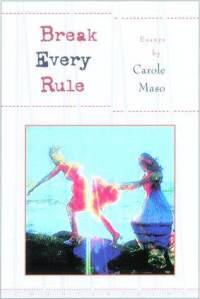 I’ve never actually read Carole Maso, but I love this answer from an interview in the Barcelona Review (2000) – referenced in a fairly scathing review of the new phenom A Visit from the Goon Squad.
I’ve never actually read Carole Maso, but I love this answer from an interview in the Barcelona Review (2000) – referenced in a fairly scathing review of the new phenom A Visit from the Goon Squad.
You take on the literary mainstream in your book of essays, Break Every Rule, making a plea to the literary establishment “not to discard the canon, but enlarge it . . . . to acknowledge, for starters, the thousand refracted, disparate beauties out there.” But—and this is the fault of big-house publishers as much as Harold Bloom et fils, as you note— doesn’t the future look rather bleak in this respect, especially with so few independent publishers left in the wake of multinational mergers and buy-outs? Who poses the bigger threat—the academics who prescribe policy or the commercial publishers focused on their profit margins?
CM:I’m not feeling as bleak as many on this one. I do believe that big publishers will become more and more absurd, publishing less and less of any value whatsoever and it will become increasingly clear that this is simply not where serious work is available anymore. It will become more and more vulgar and trashy and formulaic, I think. Today you see all kinds of so-called serious fiction that is nothing more than pretensions versions of Hollywood movies and soon enough big time publishing will just be one arm of that miserable industry. Publishers of the usual crap which masquerades as innovative or cutting edge or “transgressive,” whatever— which they justify by economics, market research, the buying public etc.—will become archaic, obsolete and even more ludicrous than they are already. And far more transparent I think.
So then what? There will be a huge gap that will need to be filled. Real readers aren’t going to just give up—neither are real writers. No book, no matter how daring or noncommercial, will go out of print as the Internet moves into maturity. This is a remarkable thing. I believe the electronic future, which there is obviously no holding back, will be where the action is. There is no question in my mind that the salvation of past and future literature lies in the electronic realm. Harold Bloom mourns the end of the reading experience as we have always known it, and I do too a little, but whole new ways of reading and perception will open up. Also the electronic world will be a more democratic one. Publishers won’t be able to keep out or impose their “tastes.” Of course there will be a lot of junk, but very quickly there will be ways to deal with it, I think. I worry a little about the loss of thought as we now know it. We are on the cusp of such radical change—it’s like 1900 all over again. One once feared that the Machine Age would mean the end of silence and would change the reading experience— and it did change it, irrevocably, of course. I think there is always fear—and not without reason. And there is always mourning—there’s no way around it. But I think the future is electronic and there’s no reason to get all freaked out about it.
Get an Editorial Review | Get Amazon Sales & Reviews | Get Edited | Publish Your Book | Enter the SPR Book Awards | Other Marketing Services






















Leave A Comment